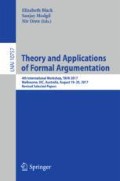Abstract
We provide an overview on the argumentation libraries of the Tweety library collection to artificial intelligence and knowledge representation. These libraries comprise of implementations to abstract argumentation frameworks, as well as the most popular approaches to structured argumentation, and various further aspects. We briefly sketch the functionalities of these libraries and give some pointers to how they can be used.
Access this chapter
Tax calculation will be finalised at checkout
Purchases are for personal use only
Notes
- 1.
- 2.
- 3.
- 4.
The class name DungTheory was chosen in favour of the class name AbstractArgumentationFramework in order to avoid confusion with the Java term abstract which is usually used as a prefix of an abstract class.
- 5.
References
Baroni, P., Caminada, M., Giacomin, M.: An introduction to argumentation semantics. Knowl. Eng. Rev. 26(4), 365–410 (2011)
Besnard, P., Hunter, A.: Knowledgebase compilation for efficient logical argumentation. In: Proceedings of the 10th International Conference on Knowledge Representation (KR 2006), pp. 123–133. AAAI Press (2006)
Besnard, P., Hunter, A.: Elements of Argumentation. The MIT Press, Cambridge (2008)
Bonzon, E., Delobelle, J., Konieczny, S., Maudet, N.: A comparative study of ranking-based semantics for abstract argumentation. In: Proceedings of the 30th AAAI Conference on Artificial Intelligence (AAAI 2016) (2016)
Brewka, G., Ellmauthaler, S., Strass, H., Wallner, J.P., Woltran, S.: Abstract dialectical frameworks revisited. In: Proceedings of the 23rd International Joint Conference on Artificial Intelligence (IJCAI 2013) (2013)
Dung, P.M.: On the acceptability of arguments and its fundamental role in nonmonotonic reasoning, logic programming and n-person games. Artif. Intell. 77(2), 321–358 (1995)
Egly, U., Gaggl, S.A., Woltran, S.: ASPARTIX: implementing argumentation frameworks using answer-set programming. In: Garcia de la Banda, M., Pontelli, E. (eds.) ICLP 2008. LNCS, vol. 5366, pp. 734–738. Springer, Heidelberg (2008). https://doi.org/10.1007/978-3-540-89982-2_67
Garcia, A., Simari, G.R.: Defeasible logic programming: an argumentative approach. Theory Pract. Log. Program. 4(1–2), 95–138 (2004)
Gelfond, M., Leone, N.: Logic programming and knowledge representation - the A-prolog perspective. Artif. Intell. 138(1–2), 3–38 (2002)
Grossi, D., Modgil, S.: On the graded acceptability of arguments. In: Proceedings of the 24th International Joint Conference on Artificial Intelligence (IJCAI 2015), pp. 868–874 (2015)
Hansson, S.O.: A Textbook of Belief Dynamics. Kluwer Academic Publishers, Norwell (2001)
Hunter, A., Thimm, M.: On partial information and contradictions in probabilistic abstract argumentation. In: Proceedings of the 15th International Conference on Principles of Knowledge Representation and Reasoning (KR 2016), April 2016
Hunter, A., Thimm, M.: Optimization of dialectical outcomes in dialogical argumentation. Int. J. Approx. Reason. 78, 73–102 (2016)
Leite, J., Martins, J.: Social abstract argumentation. In: Proceedings of the 22nd International Joint Conference on Artificial Intelligence (IJCAI 2011) (2011)
Li, H., Oren, N., Norman, T.J.: Probabilistic argumentation frameworks. In: Proceedings of the First International Workshop on the Theory and Applications of Formal Argumentation (TAFA 2011) (2011)
Modgil, S., Prakken, H.: The ASPIC+ framework for structured argumentation: a tutorial. Argum. Comput. 5, 31–62 (2014)
Reiter, R.: A logic for default reasoning. Artif. Intell. 13, 81–132 (1980)
Rienstra, T., Thimm, M., Oren, N.: Opponent models with uncertainty for strategic argumentation. In: Proceedings of the 23rd International Joint Conference on Artificial Intelligence (IJCAI 2013), August 2013
Thimm, M.: A probabilistic semantics for abstract argumentation. In: Proceedings of the 20th European Conference on Artificial Intelligence (ECAI 2012), August 2012
Thimm, M.: Tweety - a comprehensive collection of java libraries for logical aspects of artificial intelligence and knowledge representation. In: Proceedings of the 14th International Conference on Principles of Knowledge Representation and Reasoning (KR 2014), pp. 528–537, July 2014
Thimm, M.: The tweety library collection for logical aspects of artificial intelligence and knowledge representation. Künstliche Intelligenz 31(1), 93–97 (2017)
Thimm, M., Kern-Isberner, G.: On controversiality of arguments and stratified labelings. In: Proceedings of the Fifth International Conference on Computational Models of Argumentation (COMMA 2014), September 2014
Toni, F.: A tutorial on assumption-based argumentation. Argum. Comput. 5(1), 89–117 (2014)
Author information
Authors and Affiliations
Corresponding author
Editor information
Editors and Affiliations
Rights and permissions
Copyright information
© 2018 Springer International Publishing AG, part of Springer Nature
About this paper
Cite this paper
Thimm, M. (2018). The Formal Argumentation Libraries of Tweety. In: Black, E., Modgil, S., Oren, N. (eds) Theory and Applications of Formal Argumentation. TAFA 2017. Lecture Notes in Computer Science(), vol 10757. Springer, Cham. https://doi.org/10.1007/978-3-319-75553-3_9
Download citation
DOI: https://doi.org/10.1007/978-3-319-75553-3_9
Published:
Publisher Name: Springer, Cham
Print ISBN: 978-3-319-75552-6
Online ISBN: 978-3-319-75553-3
eBook Packages: Computer ScienceComputer Science (R0)

